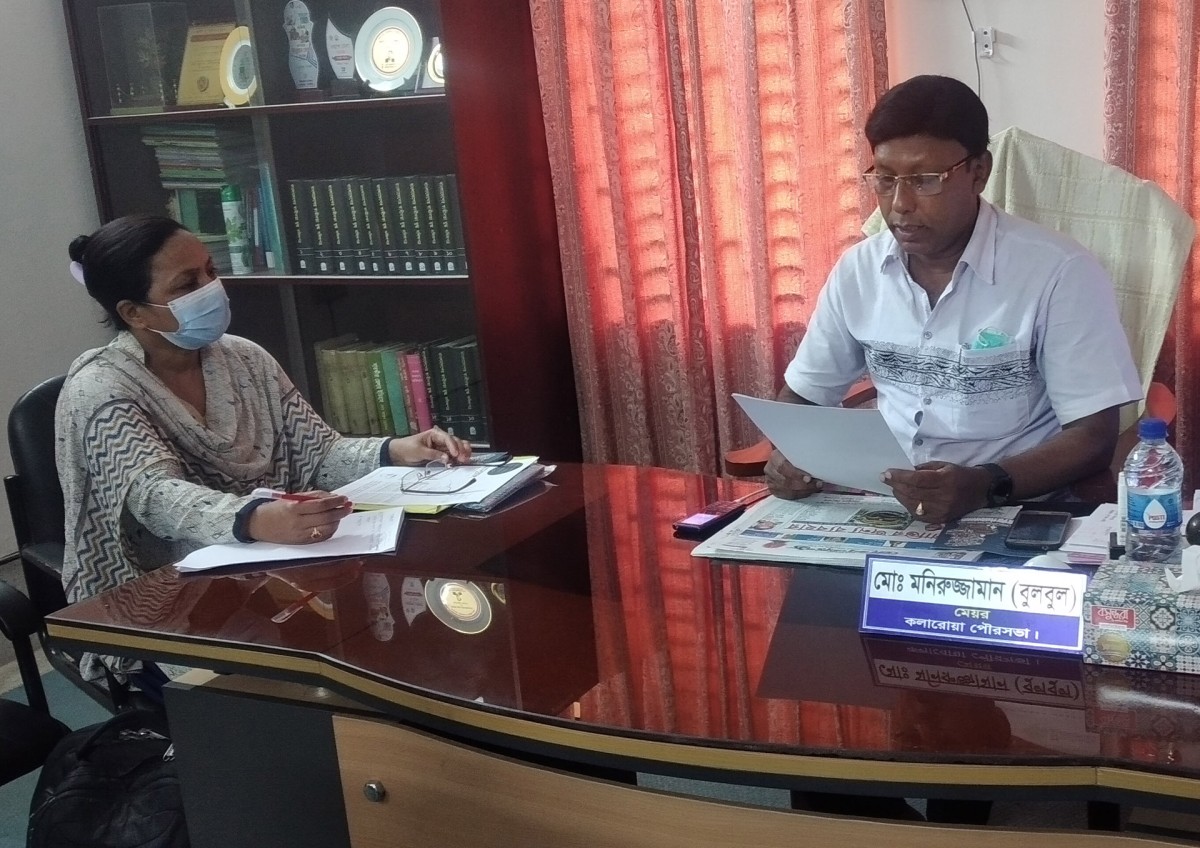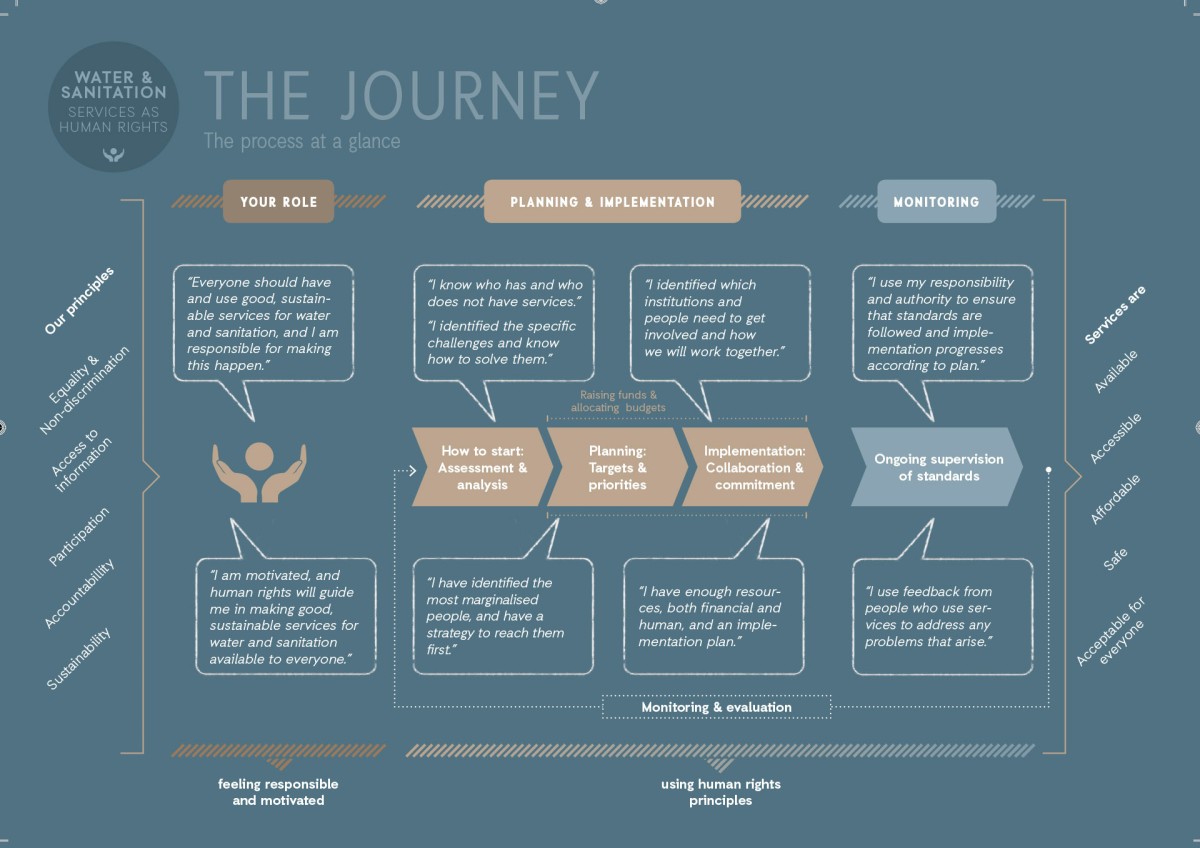How Make Rights Real helps realise the human rights to water and sanitation in Bangladesh
Written by Noa Gortworst
Making the human rights to water and sanitation real is something that Zohurul Haque Khan is passionate about. As the chairperson of the Health, Water and Sanitation standing committee of the Patharghata Municipality in Bangladesh he is dedicated to improving the lives of the people in his community. However, local government officials such as Zohurul Khan often face many obstacles. The Make Rights Real approach, in this case used within the Simavi WAI WASH SDG Bangladesh Sub-programme, supports them to become true water champions.
Human Rights Day and the Human Rights to Water & Sanitation
The 10th of December marks International Human Rights Day. Each year we commemorate the adoption of the Universal Declaration of Human Rights by the United Nations General Assembly. All countries in the world agree that every person is entitled to the human rights to water and sanitation. However, the reality remains that many countries are struggling to achieve services for all. That is why on this day, Simavi takes a moment to highlight the human right to water and sanitation (HRWS) and the Make Rights Real (MRR) approach that pro-actively engages local government officials to encourage them to act for the realisation of communities’ rights to water and sanitation.
First adopted by the United Nations General Assembly in 2010, the human rights to water and sanitation are implicitly recognised by several international human rights treaties. Access to safe drinking water and sanitation is essential for a full enjoyment of life for all humans. There are multiple elements to HRWS: not only should drinking water be available and accessible to all without discrimination, but it should also be safe, acceptable, and affordable. Similarly, the right to sanitation entitles everyone to have physical and affordable access to sanitation at all time that is safe and acceptable.
Water and sanitation are often not approached through a human rights lens, while we think this is necessary to ensure that every person has access to water and sanitation facilities. The MRR consortium, of which Simavi is a partner, enables WASH specialists to coach local government officials to overcome challenges to the realisation of water and sanitation services for all. Make Rights Real (MRR) has been applied in over 12 countries by 37 civil society organisations. MRR is foremost a knowledge hub. In Bangladesh, Simavi works to realise HRWS for all as part of the Simavi WAI WASH SDG Bangladesh Sub-programme, using the MRR approach as one of the methods for lobby and advocacy.
What is Make Rights Real?
Make Rights Real (MRR) was formed out of collaboration between Simavi, WASH United, WaterAid, UTS Institute for Sustainable Futures, UNICEF, RWSN and EWP. The platform aims to inspire and guide duty bearers to support the realisation of the HRSW through talks, tools, and information.
These organisations all have expertise on the technical aspects of water, sanitation, and hygiene (WASH), as well as human rights law and international development. All partners are active across programming, advocacy, policy, and research. Simavi utilises the Make Rights Real approach in Bangladesh, specifically to help local government institutions realise human rights to water and sanitation. In Bangladesh, the MRR was first piloted in 2019 with the Development Organisation of the Rural Poor (DORP) and Stichting Land Ontwikkelings Project Bangladesh (SLOPB). Afterwards, it was scaled up, and in the summer 2021, the approach was integrated in the WASH SDG programme implemented by WASH Alliance International (WAI) in various working areas in the southern coastal part of Bangladesh.
Strengthening the potential of local heroes
A crucial part of this approach is the selection of a local persona, usually a government official, who is committed to improving the rights to water and sanitation. To Bangladesh 10 representatives of local government institutions were selected by our partners: DORP, Uttaran, and Practical Action. The MRR approach outlined a profile of a ‘would-be hero.’ This would be someone who was highly motivated to improve HRWS in their community, but still faced obstacles. These obstacles could entail not understanding what HRWS means, and how to advocate for them by their local government. Our partners would go on to keep in regular contact with these people and offer them access to a coach to guide them through the approach. The regular contact between the local government officials and partners helped to encourage the former to really advocate for HRWS.

Getting local government officials on board has not always been easy, says Hasina Parvin from Uttaran. “We would offer the MRR Manuel and ask to just take 10 minutes to discuss the summary. And after that we would come back to discuss each paragraph. People came to realise it helped them to work in a systematic way. And to make their work measurable. That would make them very happy.”
The partners put great effort in making the materials they used as accessible as possible. Partha S. Kuntal from DORP described that when they started working with the MRR materials they had them translated in Bangla. “But it turned out if was still difficult for them to understand. Then we discussed it with them using the terms from the local dialect and using examples. That made it easy for them.”
“People would ask: what new things can you share with us? And we would explain that working in a slightly different way would help them to work more structurally on the actual needs of the people.”
Partha has already witnessed the gradual improvement of institutions. “One persona, the secretary of a local government council, shared it on a meeting with his colleagues. We only had to facilitate the process. Previously the work was limited to providing tube wells and latrines, but not on a community basis. Now the people who actually need it are taken into account.”
Hasina Parvin from Uttaran recognizes this experience. “We were asked to please provide a list of socially excluded communities, which we did.”

In Patharghata, Zohurul Haque has also been able to develop his understanding of HRWS through the information tools that the Make Rights Real program offered him. These tools included a guideline, a manual and a journey about HRWS, lobbying and advocacy. With the help of monthly monitoring by DORP, he has been active in raising awareness about WASH. He has been able to represent the interests of his community to the local government. For example, after a natural disaster destroyed many sanitation facilities in his community, he made sure the local government made efforts to repair them. Furthermore, he is in communication with other government officials to set up a water treatment plan, which would ensure the water from the waterpoints is safe.
The tools that Make Rights Real provides are not only meant to deepen the understanding of HRWS, but also to accelerate lobbying and advocacy skills. The guidance MRR provides is meant to serve as a framework for actions. That way, it adds to existing WASH programmes by strengthening systems for sustainable, inclusive services. The MRR tools are designed to be easy to understand for local officials and bridge the existing gaps between HRWS in practice and in theory. The support that the would-be heroes receive is systemic and frequent. This helps increase the enthusiasm of local officials to utilise this approach.
Simavi’s partners work hard to support each would-be hero in a way that encourages them to make a difference. In order to do so, listening to each individual’s needs is of crucial importance in making MRR efficient. Because they realised the support for the would-be heroes should be systemic, our partners regularly catch up with them, in some cases monthly, to discuss the materials and listen to their own opinions about HRWS and MRR. As each persona faced different challenges in their work, these also needed addressing on an individual basis. Because of the time and efforts our partners put into working with them, and the willingness of our partners to listen to their own needs and views, many would-be heroes became very enthusiastic about the approach, which hugely contributed to the success of Making Rights Real.
The MRR approach has proven successful in empowering people across Bangladesh to advocate for the rights to water and sanitation of their communities. Not only can the approach be implemented across other WASH programs across the world, if properly contextualised there is potential for it to be implemented in other development sectors. When people on all levels of society are aware of their rights and are encouraged and properly supported to stand up for them, all rights can be made real.

